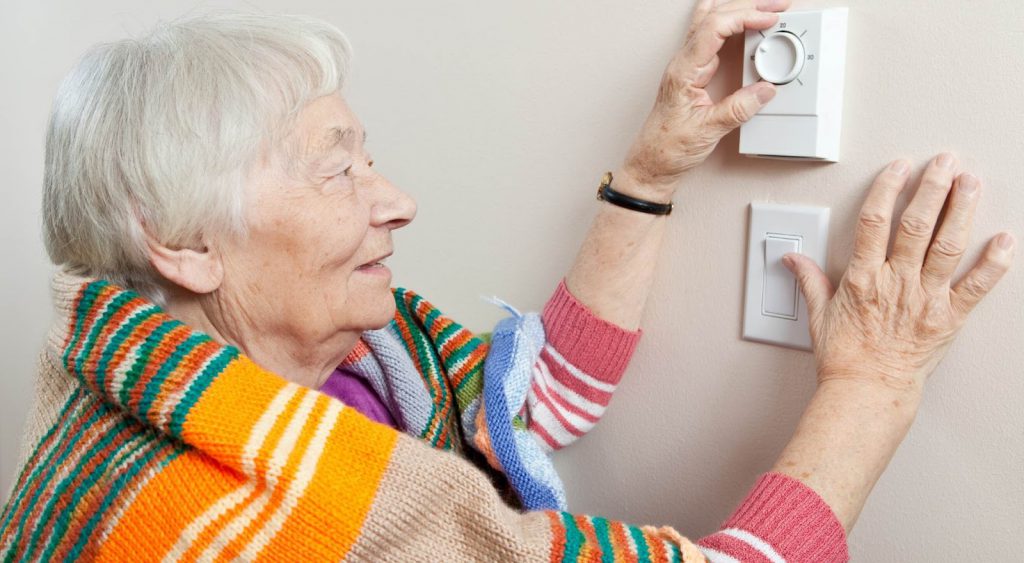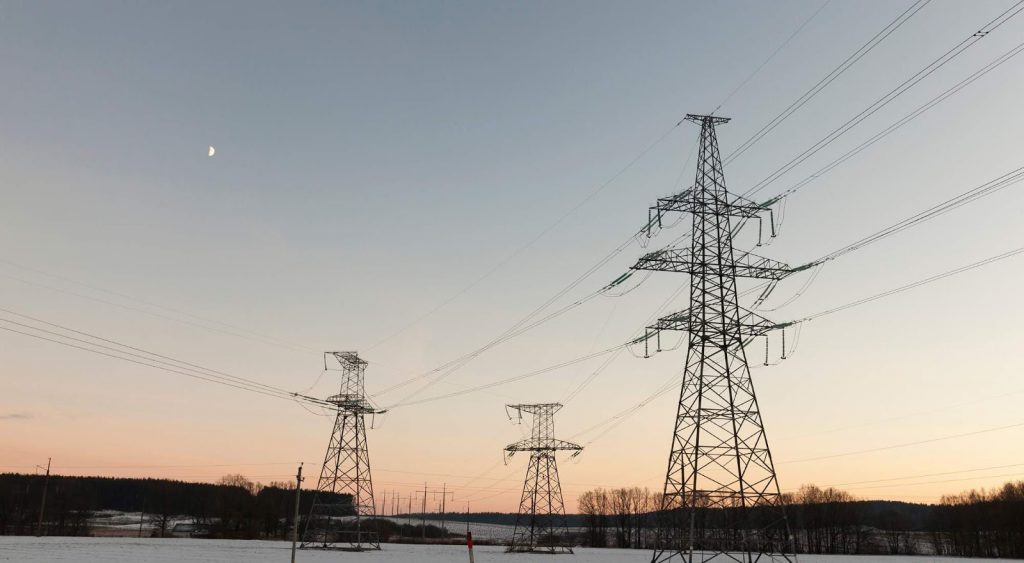You live in a house divided!
Your wife and son want the house to be a toasty 70 degrees all winter while you and your daughter enjoy a chillier house at 55 degrees. Every day, it’s another battle!
First, your daughter tells your wife to put on another sweater. Next, your wife sneaks out of bed and turns up the thermostat at night.
So that’s why you’ve resorted to asking the internet.
While we can’t tell you what temperature will be most comfortable for everyone in winter, we can help you pay the lowest possible price for electricity so that you do not have to worry about wasting electricity as someone turns up the thermostat (again).
In this guide, we will share everything you need to know about:
- Choosing the right temperature for your thermostat
- Why your bill might be higher in the winter
- And additional tips to help you save even more money
[toc]
3 Big Reasons Why Your Electricity Bill Might Increase In the Winter
Most people think high electricity bills are reserved for the hot summer months.
But this is not always true.
One of the main reasons electricity bills are higher in the winter is because of the huge temperature difference between outside and inside your home.
Think about it: Summer temperatures in Texas average in the high 90’s to low 100’s. Most home thermostats are set between 68-78 degrees.
The difference between the outside temperature and the inside temperature is roughly 25 degrees during the summer months.
Winter temperatures in Texas average from the mid 30’s overnight to the 60’s during the day with home thermostats set between 68-78 degrees.
This is a difference of almost 40 degrees.
Your heater works harder in the winter months, resulting in higher electricity bills.
Keep reading to find out what other factors cause your electricity bill to be higher in the winter.
Reason #1- More People Indoors
Another reason electricity bills are higher in the winter is that you typically spend more time indoors during the colder months.
As the days get shorter and colder, you trade the great outdoors for the comfort of your home.
Restaurants often report a decrease in business during the winter months.
Do you really want to leave your warm and cozy home to face the frigid outside temperatures?
In addition to avoiding frosty weather, the holidays usually mean more people in your home, which results in higher energy bills.
The winter months are full of major holidays like:
- Thanksgiving
- Christmas
- Hanukkah
- Kwanzaa
- Boxing Day
- New Year’s
Holidays are a cherished time. You are blessed to have the opportunity to spend time with family and friends as you gather together to celebrate.
But holiday gatherings and celebrations can also increase your winter electricity bills.
When you have visitors, your energy usage increases-more hot showers, more lights turned on, more dishes washed, and more food cooked.
Extra people = extra energy usage. Extra energy usage = higher electricity bills.

Kids Are Home
Winter months are synonymous with school winter break. Whether it is your little ones or your college kids, when they are home, the electricity bills go up.
Kids are bored during the day, so they play video games, watch TV, and are constantly charging something.
Your college kids bring months and months’ worth of laundry and a bottomless stomach.
All of this adds up to high electricity bills because more energy is being used.
And because everyone is home, you want your house to be nice and toasty, so you set your thermostat higher than usual.
Reason #2 – Baby, It’s Cold Outside
Texas is a big state. Winter temperature varies quite a bit depending on which part of the Lone Star state you live in.
Many places in Texas experience below-freezing temperatures overnight and early mornings. Daytime temps range anywhere from the 50’s-to 70’s.
Cold weather sends you in search of warm, cozy, and comforting things.
You try many things to stay warm, like:
- Cranking up the heater
- Taking hot showers
- Using electric blankets
- Soaking in warm bubble baths
- Bringing out the space heaters
All of these things keep you warm, but they also make your electricity bill higher in the winter.
So, what should you keep your heat on to save money?
Reason #3- Using the Heater Uses A Lot of Electricity
You know your heater turns on and off throughout the day and night.
You sometimes hear it click on or cut off, but mostly you don’t think about your electricity or your heater.
After all, you think you have your thermostat set at the best temperature to save money on heat.
Then why does it seem like your heater turns on and off all day long?
Most heaters in milder winter climates like Texas run a total of two or three hours a day, usually running for 5-10 minutes at a time.
Electric heaters use approximately 1,800 watts. One watt is equal to 1,000 kilowatts. This means an average heater uses 1.8 kilowatts per hour.
The average square footage of a home in Texas is 2,400 sq ft. This means the average home in Texas uses 18,000 watts, or 1.8 kWh, per hour for heating.
If your current electricity plan has a rate of 10.0¢ per kWh and your heater runs on average for 3 hours a day, you are paying $165.00 a month to operate just your heater.
That may not seem like a lot for an electric bill, but that figure does not include all the other electricity you are using in your home during a month.
Once you add in the cost of…
- Lights
- TVs
- Kitchen appliances
- Washer and dryer
- And anything else that uses electricity
…your winter bills could easily surpass $200 a month.
How do you save money on your winter electricity bill? Continuing reading to find out.
How the Cost of Electricity is Calculated
We have talked about the fact that heaters use a lot of electricity. But how is the cost of electricity calculated?
The cost of electricity is based on the current electricity rates in your area.
The current U.S residential rates range from 8.37¢ per kWh to 37.34¢ per kWh.
Why is there such a difference in electricity rates?
Location–specifically whether deregulated electricity is available in your location or not.
Most of Texas has deregulated electricity, which means Retail Electric Providers (REPs) buy and sell energy.
Power Generators produce energy, then sell it to REPs. REPs then sell energy to consumers (that’s you).
REPs buy electricity at the lowest possible rate and sell it to their customers while still making a profit.
These are a few other factors that influence the current rates for electricity in Texas:
- Weather
- Supply and Demand
- Distribution
This affects how much you pay per kWh for electricity, but there is something else that contributes to your electricity bills–your energy usage.
Energy usage is like a thumbprint—everyone’s is unique.
Several factors are considered when determining your energy usage profile, including:
- Square footage of your home
- Age of your home
- Your zip code
- The time of day your energy usage is highest
Not sure how to calculate your energy usage? Power Wizard can do it for you.
We use the above factors to determine your unique energy profile and use it to locate the best available electricity plan for you.
Discover the best electricity rates.
Power Wizard finds you the best electricity plan and ensures you won’t overpay for electricity again.
Learn More in Under 2 MinsIs It Possible to Lower Your Winter Rates?
You’re reading this article because you want to know what would be the best temp to keep your heat on to save money. You also want to know if lowering or raising your heater’s temperature will actually save money.
Yes, it will.
Let’s look at Tammy and Jacob:
They are a newlywed couple living in Ft. Worth, Texas. They recently purchased their first home, a brand new 2,000 sq. ft home.
Jacob is a cold-natured person, so he previously kept his thermostat set at 78 degrees in the winter. Nice and toasty.
It was not that big of a deal since his bachelor pad was a 600 sq ft apartment, and his electricity plan had a rate of 8.0¢ per kWh. His average electric bills in the winter were under $100.00.
Once Tammy and Jacob moved into their new home, they noticed their electric bills were nearly $200.00 a month. Isn’t electricity supposed to be cheaper in the winter?
Not necessarily. A heater uses more kWh per hour than an air conditioning unit.
One simple way Tammy and Jacob can save on their electric bill is to lower their thermostat by just a few degrees.
If you want to learn practical ways to lower your winter electricity bills, keep reading.
First, let’s look at your thermostat.

What Temp Do You Set Your Thermostat In Winter?
By simply adjusting your thermostat back 7-10 degrees for eight hours a day, you can save 10% annually.
You wonder if changing your thermostat in the winter will make your home uncomfortably cold.
Is it possible to save money and be comfortable?
Yes, setting your thermostat to 68 degrees during the day and 64 degrees at night can still result in big savings on your electricity bills.
Sleep.org suggests the perfect temp for sleep is 60-67 degrees.
Leave It Alone
If you are going to be away from your home for 8 hours or more, dropping the thermostat a few degrees can save money.
However, constantly changing the temperature throughout the day will likely not save money and will only make you uncomfortable.
Thermostat Placement
Your thermostat detects the temperature where it is located. If the temperature is lower than the set number, your heater will kick on.
Once the area around the thermostat reaches the desired temperature, then the heater will turn off.
This is why thermostat placement is so vital to not only saving money on your electric bill but ultimately your comfort as well.
Even if you set your thermostat to the right temperature, if it is not placed in the appropriate place in your home, you could be losing money.
A thermostat should not be placed in the following areas:
- Above or near an air vent
- In direct sunlight
- Kitchen
- Hallways
- Near doors and windows
A thermostat should be placed:
- In the center of your home
- In the places, you and your family spend most of your time
- Also, consider adding a thermostat to each floor of your home
Time For An Upgrade
Having to replace any major appliance in your home can be a huge stressor. The cost and time involved can feel overwhelming.
However, if you don’t replace an old and inefficient heater, it can actually cost you more in the long run.
The average life of a heater is around 15-20 years. If your heater has not been properly maintained, it could take far less time.
You may need to replace your heater if you experience:
- Major repairs
- High electricity bills
- Strange noises
- The thermostat setting is not keeping the home comfortable
Programmable Thermostat
Technology has enhanced all of our lives.
We have cars that drive themselves, remotes that we can speak to, and they can even help us educate our children at home.
Technology can also help you save money on your electricity bill.
A programmable thermostat adjusts the temperature according to a series of programmed settings that take effect at different times of the day.
You can set one temperature for when you are at home, a different temp for when you are away, and another for when you are sleeping.
Smart Thermostat
Is there a difference between a programmable thermostat and a smart thermostat?
Yes, sort of.
Smart thermostats are also programmable, but they differ in their ability to learn behavior over time and automatically adjust temperatures based on your habits.
Other Thermostat Don’ts
Additional things to keep in mind:
- Heat Pumps: Don’t rely on the emergency heat setting. On really cold days, the normal heat setting will save you more in the long run.
- Don’t crank up the thermostat temperature setting significantly to heat your home quickly. Thermostats set at a lower temperature run longer but don’t necessarily heat your home any faster.
- The one thing you could achieve by doing these things is an unreasonably high utility bill.
Energy Savings Per Degree
Texas has mild winters, right? Sure, when compared to Alaska or the Northeast.
High and low temperatures vary vastly in the winter months.
Let’s take a quick look at these temperature variations in a few major Texan cities:
- Houston
- The average low is 48 degrees
- The average high is 65 degrees
- Dallas
- The average low is 39 degrees
- The average high is 59 degrees
- Corpus Christi
- The average low is 49 degrees
- The average high is 70 degrees
- Abilene
- The average low is 34 degrees
- The average high is 58 degrees
Perhaps you are wondering, “Why are we sharing this information, and why does it matter?
The answer is simple–heat loss in a home is driven by the difference between outside and inside temperatures.
A study conducted by the Lawrence Berkeley Lab shows the average inside temperature fluctuated from week to week. It also suggested most homes generally do not maintain a constant inside temperature throughout the winter.
The larger the difference between the outside temperature and inside temperature, the faster-heated air moves to the outside.
Again, you are thinking, “Why does this matter?”
It matters because if you live in Corpus Christi and set your thermostat at 72 degrees throughout the winter, your heater will work harder in the evenings and nights. When the outside temperature is only 2 degrees below your desired temp, your heater will continue to run during the daytime as well.
If you live in Dallas, where the temperature fluctuates 20 degrees throughout the day, and you set your thermostat to 78 degrees, your heater will probably never turn off.
A constant or nearly constant running heater will rack up dollars on your electricity bill.

The Best Hours To Use or Conserve Electricity
We have talked about why your winter electricity bills might be higher and what you can do to lower them. We also suggested the best temp set heat and how thermostats affect the cost of your bills.
But did you know the time of day you use electricity can also affect your electricity bill?
Let’s break down the cheapest and the not so cheap times of day to use electricity.
1. Peak Hours:
These are the hours of the day when electricity usage is at its highest. Generally, between 7:00 am-11:00 am and 5:00 pm to 9:00 pm. This is also when electricity costs per kWh are the highest.
2. Mid-Peak Hours:
These are hours when electricity usage is at an average rate. These hours in the winter range from 11:00 am-5:00 pm. The cost of electricity during these hours is generally average, just as the usage is.
3. Off-Peak Hours:
These are hours when electricity usage is at the lowest. This is the best time to use electricity because the cost is the lowest. These hours are generally 9:00 pm to 7:00 am as well as Saturdays, Sundays, and major holidays.
When Is The Cheapest Time To Use Electricity In The Winter?
Planning large holiday gatherings or the majority of your energy usage during off-peak hours can save you a good deal of money on your electricity bills.
Bonus- Additional Proven Ways To Save On Electricity In The Winter
Additional ways to save on electricity in the winter:
- Use energy-efficient appliances
- Wear warmer clothing indoors
- Inspect and replace filters
- Caulk or seal windows and outside doors
Discover the best electricity rates.
Power Wizard finds you the best electricity plan and ensures you won’t overpay for electricity again.
Learn More in Under 2 MinsHow Switching Energy Companies Can Help You Save Money On Your Winter Rates
You want to know what you should keep your heat on to save money, but did you know that switching energy companies could save you even more money?
Switch The Hard Way
Texas has over 160 Retail Electric Providers and nearly 2,000 individual plans.
If you choose to find an electricity plan on your own (the hard way), you begin the process of manually searching for an REP that services your area.
Step 1: Scour the internet for power companies near you.
Step 2: Review the results list. Depending on your location, your results list may be anywhere from 4 or 5 companies to 20-30 companies.
Step 3: Review each plan for each REP. Each plan offers different electricity rates per kilowatt-hour (kWh), optional perks, and additional benefits.
Step 4: Create a spreadsheet of every single available electricity plan that services your zip code.
Step 5: Then you must read each contract and the terms of service for every single REP in your area.
This is a dreadful option. You would probably rather be at the dentist with no happy gas having teeth pulled than spending HOURS searching for an electricity plan.
But there is good news: You do not have to spend hours searching through this enormous amount of information to find the best available electricity plan for your needs.
Or Switch The Easy Way
There is another option: spend less than 5 minutes using Power Wizard’s unbiased algorithm.
Let us do all the work of crunching the numbers to find the best electricity plan for your specific electricity needs.
The Magic of Power Wizard
It’s akin to magic. Power Wizard’s proprietary technology searches and compares 100’s electricity plans in a matter of seconds to find you the perfect plan for your home.
Are you ready to experience the magical savings of Power Wizard?
Let us find you the best electricity plan in seconds and start saving.








